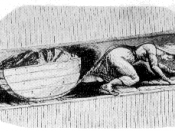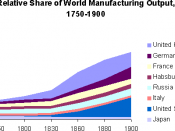Peace and Economic Growth: Britannia Rules
-Britain was not involved in a major European war until World War I began in 1914.
-The empire that had begun in the seventeenth and eighteenth centuries with British interests in India and North America grew steadily
-Victoria was queen-empress of more than two hundred million people living outside Great Britain. - The Industrial Revolution of the eighteenth century greatly expanded. It moved through booms and depressions, but over the course of the century it steadily created new towns, new goods, new wealth, and new jobs for tens of thousands of people climbing through the complicated levels of the middle class.
-These social and economic changes were expressed in gradual political reforms. Middle-class and ultimately working-class politicians and voters achieved political power while leaving the monarchy and aristocracy in place.
The Victorian era was a time of relative peace and economic growth. The British Empire grew steadily, the Industrial Revolution expanded, and political power was extended to the middle and working classes.
The Idea of Progress: "An Acre in Middlesex"
- English historian Thomas Babington Macaulay eloquently voiced the middle-class Victorian attitude toward government, history,
-Macaulay admired cleanliness and order.
He wanted the London streets free of garbage, drained and paved, lighted at night, and patrolled by a sober police force, wanted the city planned so that residents of respectable neighborhoods did not live next to hovels and were not annoyed by beggars and peddlers -Many Victorians regretted or disputed Macaulay's confident tone and materialistic standards. But in his satisfaction with the improvements that empire had brought to England, his views were typical of those of his contemporaries.
Middle-class Victorians prided themselves on their material advances and on their ability to solve social problems.
The "Hungry Forties"
-The period came to be known as...


